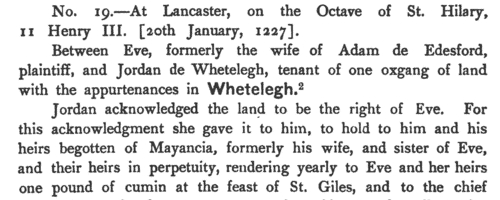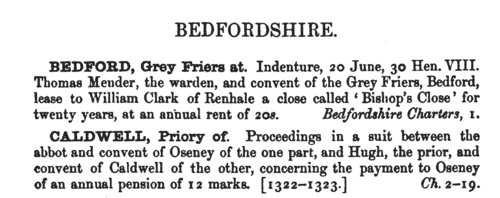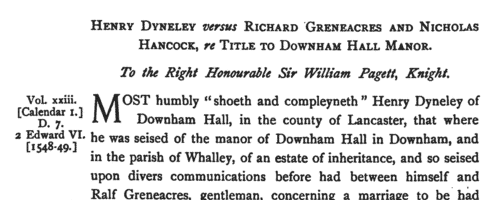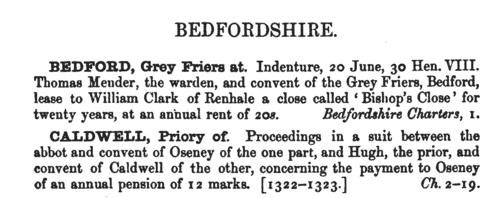Pedder Surname Ancestry ResultsOur indexes 1000-1999 include entries for the spelling 'pedder'. In the period you have requested, we have the following 276 records (displaying 1 to 10): Single Surname Subscription | | | Buying all 276 results of this search individually would cost £1,532.00. But you can have free access to all 276 records for a year, to view, to save and print, for £100. Save £1,432.00. More... |
These sample scans are from the original record. You will get scans of the full pages or articles where the surname you searched for has been found. Your web browser may prevent the sample windows from opening; in this case please change your browser settings to allow pop-up windows from this site. Lancashire Assizes
(1202-1285)
All the surviving records of the assizes held by the royal justices in eyre (itinerant) in Lancashire during this period were extracted by colonel John Parker and published by the Lancashire and Cheshire Record Society from 1904. The justices not only tried all civil actions outstanding on their advent, pleas of the crown and common pleas, but also interrogated the juries of each wapentake and borough as to the Capitula Itineries, the Articles of the Eyre, inquiring into the king's proprietary rights, escheats, wardships, and questions of maladministration. Only a dozen complete rolls survive for this period; but Appendix I (pp. 218-253) gathers together from the Patent Rolls of the reign of Henry III (1216-1272) a schedule of Lancashire assizes for which justices were assigned; and Appendix II (306-342) adds the fines and amercements before the justices during that reign, as recorded on the Pipe Rolls.PEDDER. Cost: £4.00.  | Sample scan, click to enlarge

| Lancashire Feet of Fines
(1196-1307)
Pedes Finium - law suits, or pretended suits, putting on record the ownership of land in Lancashire. These abstracts were prepared by William Farrer for the Lancashire and Cheshire Record Society and published in 1899, under the title 'Final Concords of the County of Lancaster, from the Original Chirographs, or Feet of Fines, preserved amongst the Palatinate of Lancaster Records in the Public Record Office'. They cover the period from the 7th year of king Richard I to the end of the reign of king Edward I, with a couple of fragmentary survivors from earlier (1187 and 1194).PEDDER. Cost: £4.00.  | Sample scan, click to enlarge

| Inhabitants of Yorkshire: Agbrigg Ash wapentake
(1379)
The poll tax returns for this wapentake, the area around Dewsbury, Huddersfield and Wakefield.PEDDER. Cost: £6.00.  | Sample scan, click to enlarge

| Inhabitants of Yorkshire: Staincliff wapentake
(1379)
The poll tax returns for this wapentake, the area around Keighley, Settle and Skipton.PEDDER. Cost: £6.00.  | Sample scan, click to enlarge

| Inhabitants of Yorkshire: The Ainsty
(1379)
The poll tax returns for this wapentake, the area around the city of York.PEDDER. Cost: £6.00.  | Sample scan, click to enlarge

| Norfolk Charters
(1510-1519)
A large accumulation of documents preserved in the Bodleian Library, Oxford, formerly constituted the antiquarian collections of Anthony a Wood, Roger Dodsworth, Ralph Thoresby, Thomas Martin of Palgrave, Thomas Tanner bishop of St Asaph, Dr Richard Rawlinson, Richard Furney archdeacon of Surrey, and Richard Gough. A calendar of these was prepared by William H. Turner and published in 1878 under the title 'Calendar of Charters and Rolls preserved in the Bodleian Library'. The word 'charters' is here used in a rather loose sense, including virtually any manuscript or copy of a manuscript, but the bulk of the contents consists of mediaeval deeds of conveyance. Turner's calendar deals with each briefly, naming the principal parties and the nature of the deed, but hardly ever lists the witnesses. Many of these charters were undated (dating of deeds did not become general until around 1350) or so damaged or defective ('mutilated' is Turner's usual description) as no longer to display a legible date. However, he contrived, from the style of the script and/or the nature of the contents, to estimate dates in such cases. The sample scan is from the start of the Bedfordshire list. PEDDER. Cost: £4.00.  | Sample scan, click to enlarge

| Inhabitants of Suffolk
(1524)
The lay subsidy granted by Act of Parliament in 1523 was a tax on the laymen (as opposed to clergy), levied on householders, landowners, those possessing moveable goods worth £1 or more, and all workmen aged 16 or over earning £1 or more per annum. Real estate was taxed at a shilling in the pound; moveable goods worth £1 to £2 at fourpence a pound; £2 to £20 at sixpence a pound; and over £20 at a shilling in the pound. Wages were taxed at fourpence in the pound. Aliens were charged double; aliens not chargeable in the above categories had to pay a poll tax of eightpence. The records of the assessment for the county of Suffolk, mostly made in 1524, survive in 64 rolls in the National Archives. From 42 of these a compilation for the whole shire was printed in 1910 as Suffolk Green Book x. This includes a list of defaulters of 1526 and a subsidy roll of 1534 for Bury St Edmunds.PEDDER. Cost: £4.00.  | Sample scan, click to enlarge

| Inhabitants of Lancashire
(1547-1558)
Pleadings and depositions in the Duchy Court of Lancaster from the 1st year of Edward VI to the 5th and 6th of Philip and Mary were edited by lieutenant-colonel Henry Fishwick for the Lancashire and Cheshire Record Society and published in 1899. The records include some long and detailed depositions about the precise facts of the cases: whereas plaintiffs and defendants were by and large from the landed gentry, deponents were often of much humbler stations in life, people who otherwise hardly appear in surviving records.PEDDER. Cost: £4.00.  | Sample scan, click to enlarge

| Staffordshire Charters
(1550-1559)
A large accumulation of documents preserved in the Bodleian Library, Oxford, formerly constituted the antiquarian collections of Anthony a Wood, Roger Dodsworth, Ralph Thoresby, Thomas Martin of Palgrave, Thomas Tanner bishop of St Asaph, Dr Richard Rawlinson, Richard Furney archdeacon of Surrey, and Richard Gough. A calendar of these was prepared by William H. Turner and published in 1878 under the title 'Calendar of Charters and Rolls preserved in the Bodleian Library'. The word 'charters' is here used in a rather loose sense, including virtually any manuscript or copy of a manuscript, but the bulk of the contents consists of mediaeval deeds of conveyance. Turner's calendar deals with each briefly, naming the principal parties and the nature of the deed, but hardly ever lists the witnesses. Many of these charters were undated (dating of deeds did not become general until around 1350) or so damaged or defective ('mutilated' is Turner's usual description) as no longer to display a legible date. However, he contrived, from the style of the script and/or the nature of the contents, to estimate dates in such cases. The sample scan is from the start of the Bedfordshire list. PEDDER. Cost: £4.00.  | Sample scan, click to enlarge

| Scottish litigants, rebels and cautioners
(1585-1592)
The Privy Council of Scotland exercised a superior judicial authority in the kingdom, and consequently received and dealt with a constant stream of petitions, as well as dealing with the internal security of the state. This register of the council from 1 August 1585 to 31 July 1592, in the reign of king James VI, was edited by David Masson, and published under the direction of the Lord Clerk Register of Scotland in 1881. Some of the individuals mentioned are the complainants, those of whom they complained, and the sureties on both sides: at this period, some of the complainants are alleging serious attacks, often of a feuding nature. Many of the bonds entered into by the cautioners are promises to keep the peace towards such enemies. Failure to answer to the council when summoned was a serious contempt, leading to being denounced a rebel, with serious consequences. But 'horning' was also used in the pursuit of debts: there was no imprisonment for debt in Scotland, but a creditor could have an obstinate debtor ordered, in the sovereign's name, to pay what was due, failing which, the debtor could be put to the horn, denounced as a rebel, and imprisoned as a rebel. The main text (to page 774) is from the Acta Secreti Concilii, containing the minutes of the Privy Council, with intermixed Acta Proper (political edicts), Decreta (judicial decisions), Acta Cautionis (acts of caution) and Bands (registration of bonds). After that are printed some miscellaneous Privy Council documents from the same years: additional acts of caution (775-778); ordinances and acts anent the Borders and the North (779-814); and miscellaneous privy council papers (815-834). The sources most productive of names, the Acta Cautionis and Registration of Bands, are also the most repetitive in form, and are not transcribed verbatim and literatim: nevertheless, one of the editor's rules was for 'All proper names and names of places occurring in the originals to be preserved in the abstracts without exception, and in the exact original spelling.'
PEDDER. Cost: £4.00.  | Sample scan, click to enlarge

|
Research your ancestry, family history, genealogy and one-name study by direct access to original records and archives indexed by surname.
|












